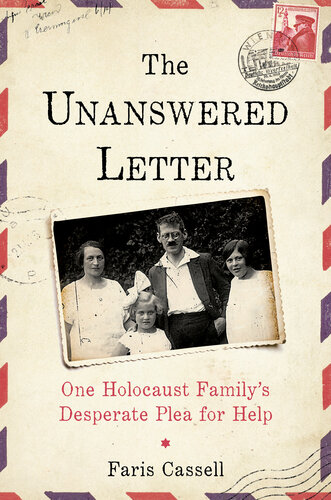
The Unanswered Letter
One Holocaust Family's Desperate Plea for Help
کتاب های مرتبط
- اطلاعات
- نقد و بررسی
- دیدگاه کاربران
نقد و بررسی

August 1, 2020
A moving account of the search for two Holocaust victims. In 2000, journalist Cassell's husband, a physician, brought home a letter given to him by an elderly patient and dated Aug. 7, 1939. The return address was in Vienna, then under Nazi rule. The letter began, "You are surely informed about the situation of all Jews in Central Europe," and went on to beg the recipient to enable him and his wife to immigrate by filing an official "affidavit of support." This was essential because U.S. policy aggressively discouraged Jewish refugees. Berger was the name of both sender and recipient, but the American Bergers were not Jewish nor related to the sender; apparently, the writer had found the name by accident. Cassell's husband's patient, she learned, had received the letter from an aunt and uncle after their death, but they had not answered it. Yielding to her journalistic instincts, the author proceeded to track down the story of the letter writer, a task that required a decade of research and travel. Thanks to the German obsession with paperwork, archives and government offices turned up a trove of information about Albert and Hedwig Berger and their large extended family whose descendants, now scattered to North and South America and Israel, delivered their letters and photographs. Many joined Cassell in Vienna to visit their ancestral homes as she completed her research. Though the narrative contains more information on an undistinguished Viennese couple than most readers want to know, the author vividly portrays a rich culture's unspeakably cruel destruction. Long settled in Vienna, the Bergers were stunned at the sudden Nazi takeover. Greeting it enthusiastically, Austrians embraced German anti-Semitic law. Jews were repeatedly assaulted, robbed, taxed, and fined, and most lost their jobs. Cassell records the painful details as most tried to emigrate. Many succeeded, but not the Bergers; Albert died in an accident in 1942, and Hedwig was deported and killed. Though often grim, the story is a historical treasure.
COPYRIGHT(2020) Kirkus Reviews, ALL RIGHTS RESERVED.

August 14, 2020
Twenty years ago, a letter arrived at journalist Cassell's home. Its author, writing some 60 years earlier, spoke with such urgency and humanity, the journalist could not avoid its call. In 1939, Alfred Berger launched a desperate plea from Vienna to an unknown Berger in California; the letter was a last hope for sponsorship and potential immigration to the United States in order to escape Nazi persecution. Driven to find what became of the Viennese Berger family, Cassell embarked on a wrenching and achingly poignant story of resiliency, hope, and the strength of family up against unthinkable horror. What results is an expertly researched and intimately fleshed-out contextualization detailing not only the incremental progression of how evil unfolds, but how individuals and families attempt to cope amid such catastrophic events. Cassell takes care to retain the letter's original conversation and tone, and the wavering hope and despair among this devastating historical backdrop. VERDICT A crushing but nonetheless important read chronicling firsthand perspectives and experiences of a lost family miraculously brought to life. Highly recommended as a respectfully told, exhaustively researched, and ceaselessly alarming call to attention.--Benjamin Malczewski, Toledo Lucas Cty. P.L.
Copyright 2020 Library Journal, LLC Used with permission.

























دیدگاه کاربران